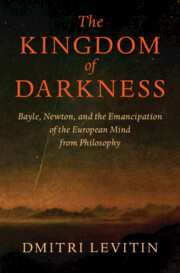Book contents
- The Kingdom of Darkness
- The Kingdom of Darkness
- Copyright page
- Contents
- Preface
- Abbreviations and Conventions
- General Prologue
- Part I Giving Up Philosophy
- Part II Pierre Bayle and the Emancipation of Religion from Philosophy
- II Prolegomena
- II.1 Greece, Asia, and the Logic of Paganism
- II.2 The Manichean Articles and the ‘Sponge of all Religions’
- II.3 Theological Method and the Foundations of Protestant Faith
- II.4 Virtuous Atheism, Philosophic Sin, and Toleration
- Part III Isaac Newton and the Emancipation of Natural Philosophy from Metaphysics
- Part IV The European System of Knowledge, c.1700 and Beyond
- Bibliography
- Index
II - Prolegomena
Pierre Bayle: a Life in the Republic of Letters at the Turn of the Eighteenth Century
from Part II - Pierre Bayle and the Emancipation of Religion from Philosophy
Published online by Cambridge University Press: 23 March 2022
- The Kingdom of Darkness
- The Kingdom of Darkness
- Copyright page
- Contents
- Preface
- Abbreviations and Conventions
- General Prologue
- Part I Giving Up Philosophy
- Part II Pierre Bayle and the Emancipation of Religion from Philosophy
- II Prolegomena
- II.1 Greece, Asia, and the Logic of Paganism
- II.2 The Manichean Articles and the ‘Sponge of all Religions’
- II.3 Theological Method and the Foundations of Protestant Faith
- II.4 Virtuous Atheism, Philosophic Sin, and Toleration
- Part III Isaac Newton and the Emancipation of Natural Philosophy from Metaphysics
- Part IV The European System of Knowledge, c.1700 and Beyond
- Bibliography
- Index
Summary
This chapter introduces Part II, on Pierre Bayle. It provides an intellectual-biographical account of Bayle’s career, emphasising both his deep immersion in circles of Reformed scholars and theologians, and the reactive dimension of his writing, which were almost always shaped by his most recent reading. It urges caution about trying to find a coherent system in all of Bayle’s writings, and instead presents a framework for a developmental account of his thought. It also introduces the historiographical debate about Bayle, and the so-called ‘Bayle enigma’. It suggests that that enigma can be dissolved even if we carefully place Bayle in his own context, and avoid misleading categories such as ‘scepticism’ and ‘fideism’.
- Type
- Chapter
- Information
- The Kingdom of DarknessBayle, Newton, and the Emancipation of the European Mind from Philosophy, pp. 227 - 250Publisher: Cambridge University PressPrint publication year: 2022

